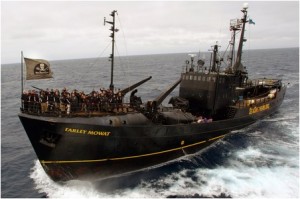 Sea Shepherd claims that their actions in the Southern Ocean opposing Japanese whaling fleets has effectively reduced the number of whales killed. What always rubbed me the wrong way about these claims is that they always compare their success against the Institute for Cetacean Research (the Japanese organization that oversees ‘scientific whaling’) Quotas. So at some point you have to ask the question, in absolute numbers, has Sea Shepherd really reduced the number of whales killed?
Sea Shepherd claims that their actions in the Southern Ocean opposing Japanese whaling fleets has effectively reduced the number of whales killed. What always rubbed me the wrong way about these claims is that they always compare their success against the Institute for Cetacean Research (the Japanese organization that oversees ‘scientific whaling’) Quotas. So at some point you have to ask the question, in absolute numbers, has Sea Shepherd really reduced the number of whales killed?
To answer that we need three pieces of information:
- When did Sea Shepherd begin it’s campaign against Japanese ‘scientific whaling’?
- What are the ICR quotas for that time frame?
- What are the absolute catches for that time frame?
Sea Shepherd provides a comprehensive timeline for their whaling campaigns that indicates serious opposition in the Southern Ocean began in December 2002. For the two other questions, we turn to Whale and Dolphin Conservation International, who have produced a truly exceptional interactive graph of the history of whaling since the inception of the International Whaling Convention by the numbers. The relevant figure is reproduced below:

 As promised, this week’s ethical debate deals with one of the most hotly debated issues in the marine conservation community- the tactics of “Sea Shepherd”.
As promised, this week’s ethical debate deals with one of the most hotly debated issues in the marine conservation community- the tactics of “Sea Shepherd”.
 The debate is whether the tactics of the Sea Shepherd Conservation Society (SSCS) are helping or hurting the cause of shark conservation. A disclaimer: this is NOT an official response from the Sea Shepherd Conservation Society (SSCS). Although I am a supporter of that organization, the thoughts and opinions expressed here are entirely my own.
The debate is whether the tactics of the Sea Shepherd Conservation Society (SSCS) are helping or hurting the cause of shark conservation. A disclaimer: this is NOT an official response from the Sea Shepherd Conservation Society (SSCS). Although I am a supporter of that organization, the thoughts and opinions expressed here are entirely my own.